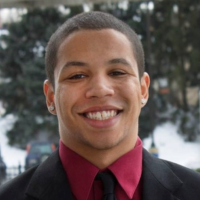Stepping Up by Stepping Out of Our Comfort Zones: The Importance of Funding DEI and Development Programs
February 4, 2019
How many different ways can you introduce yourself?
There’s “Hi my name is…” No, that’s too eager.
“Hello -” No, too formal.
“Good morning…” No, they’ve probably heard good morning ten times by the time I’m up there. (Also, what if it’s during that awkward 11:30AM “is it still morning” time frame?)
You might think these trivial, but these were just a few of the nervous thoughts that I couldn’t shake in the days leading up to the Environmental Grantmakers Association Retreat in October, where I had the opportunity to speak on the main stage about my experience as a 2018 Environmental Fellow.
Presenting at The Environmental Fellows Program is, to me, an opportunity made to push us out of our comfort zones. Of course I had spoken in public before, but usually to people that were at least somewhat familiar with me, and never to a room that could fit hundreds of attendees. And to a room full of environmental grantmakers? I had better get more than my introduction right…
I improved more than just my public speaking skills last summer. The Program helped me develop both professionally and emotionally. I learned how to take what I had studied in graduate school, such as social and racial inequities, and apply it to environmental injustices, a field relatively unfamiliar to me. I learned new skills entirely while working for a non-profit that depends on community engagement.
The thing I was most surprised to learn, however, was the significance of relationships, camaraderie—the power of a cohort, as well as the importance for advocating for diversity and equity in every imaginable arena. This was in part due to the fact that I had never taken part in a program like the Environmental Fellows. Sometimes, it’s difficult to understand the value of something you’ve never had.
At the orientation in Michigan, I grew more and more inspired listening to the Fellows talk about their educational backgrounds and research interests. When it came to the diversity, equity, and inclusion sessions, we learned how the environmental and philanthropy fields need more people like us. Not just because we are young or diverse. But because the groups that are often most vulnerable to environmental damage are diverse and underrepresented. And the organizations that are tasked with protecting the environment or improving health outcomes have been, for one reason or another, slower to respond to the call for diversity, equity, and inclusion than many would like.
If the Environmental Fellows Program and the Fall EGA Retreat are any indication, though, then there is hope that change is coming. From the first main presentation “As the South Goes, So Goes the Nation” inspired by the influential activist and author W.E.B. DuBois, I knew that the importance of diversity, equity, and inclusion was the forefront of the Retreat. It’s important that philanthropists don’t lose their momentum, though. Funding more programs like the UM Environmental Fellows that identify the next generation of leaders and enable them to have a strong support network, is just one of the countless opportunities where grantmaking organizations can apply leverage to change the system and make a more fair and environmentally just society.
Oh, and about that flash talk. Despite all the worrying in the days leading up to the Retreat, I can’t remember now which greeting I settled on that morning. But it doesn’t matter. What’s more important is the message—everyone has an important and valued role in the fight against injustice.
About Quenton King
